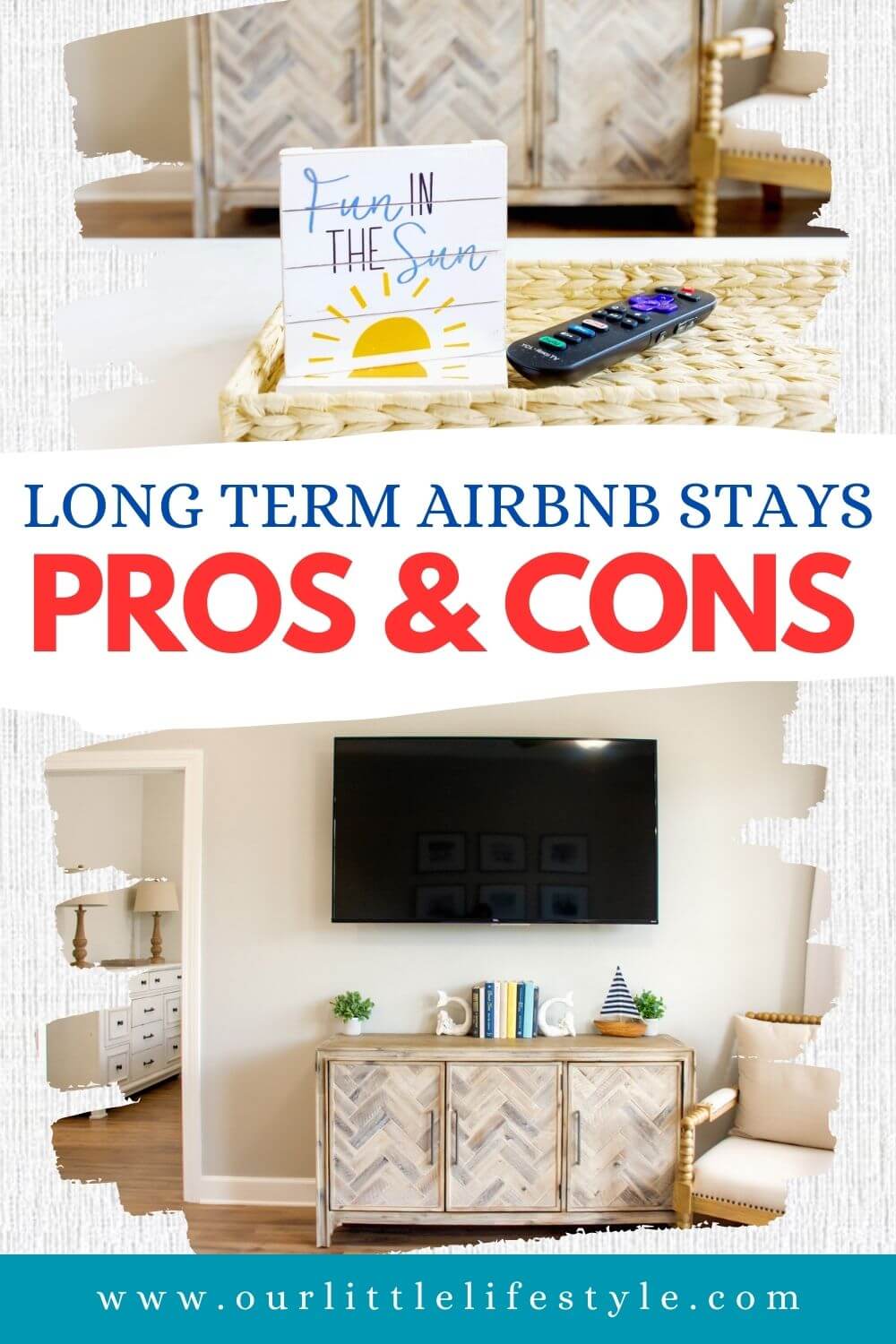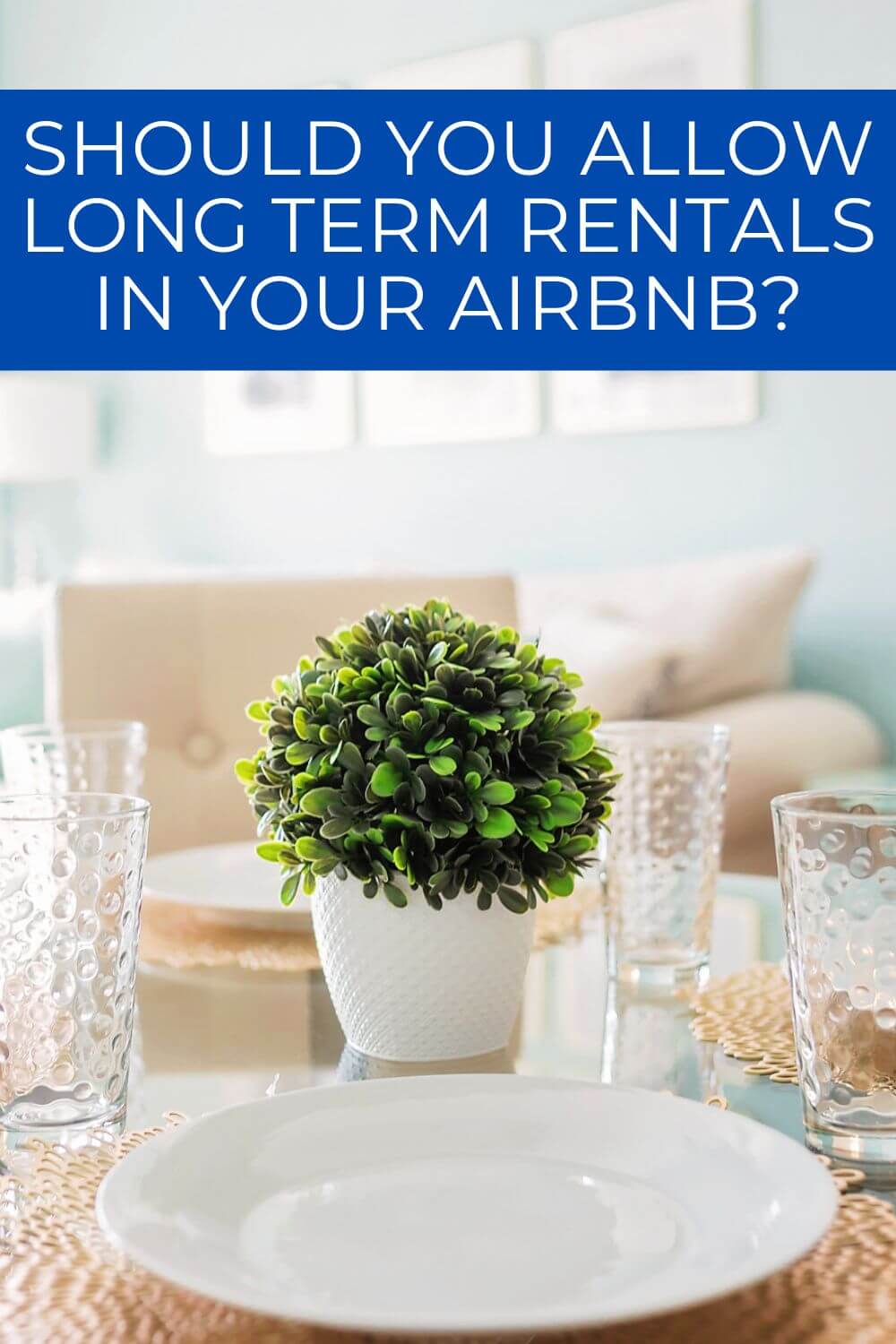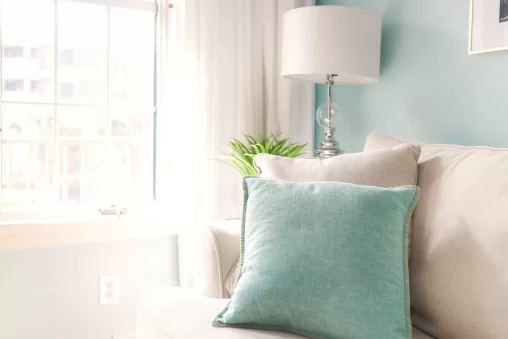We may earn money or products from the companies mentioned in this post. As an Amazon Associate, I earn from qualifying purchases.
Last week, in my Airbnb Hosting Group on Facebook, someone asked a great question: Should you allow long term rentals at your Airbnb? I think this is a great discussion since most Airbnbs are set up as short term rentals, where positive cash flow is the main goal.
However, there is a lot to consider here! So, in this Airbnb hosting blog post, I will share what you need to consider before allowing long term stays in your short term rental property. Then, I will list the pros and cons of long term rentals so that you can make the best decision for your own Airbnb listing!
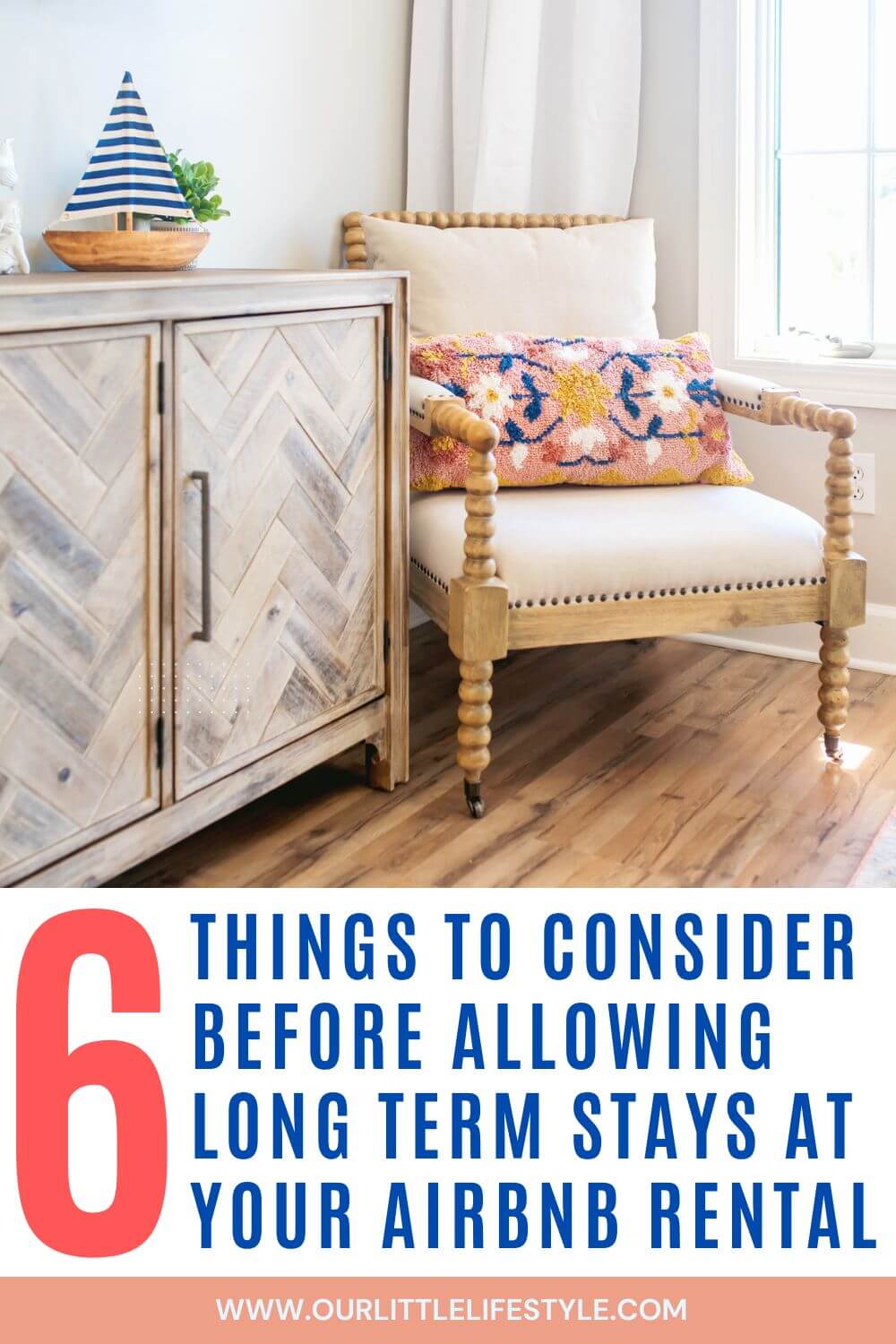
Airbnb: Long Term Rentals vs Short Term Rentals
Generally, a short term rental is a stay under a month (or 28 days, to be safe). This what you see most often on Airbnb. On the other hand, a long term rental is usually a stay of six months or longer. These are typically handled directly or by a property manager or real estate agent. Everything from one to six months is considered a mid-term stay. These are actually the trickiest, in my opinion!
My blog is about Airbnb hosting, which generally means hosting for stays of an average of three to six days and are often vacation rentals. So, for the purpose of this post, I am referring to anything over 28 days as a long-term stay. Most of the longer stays discussed here will be requests for monthly stays or three to four-month rentals, such as snowbirds.
So, should you allow them?
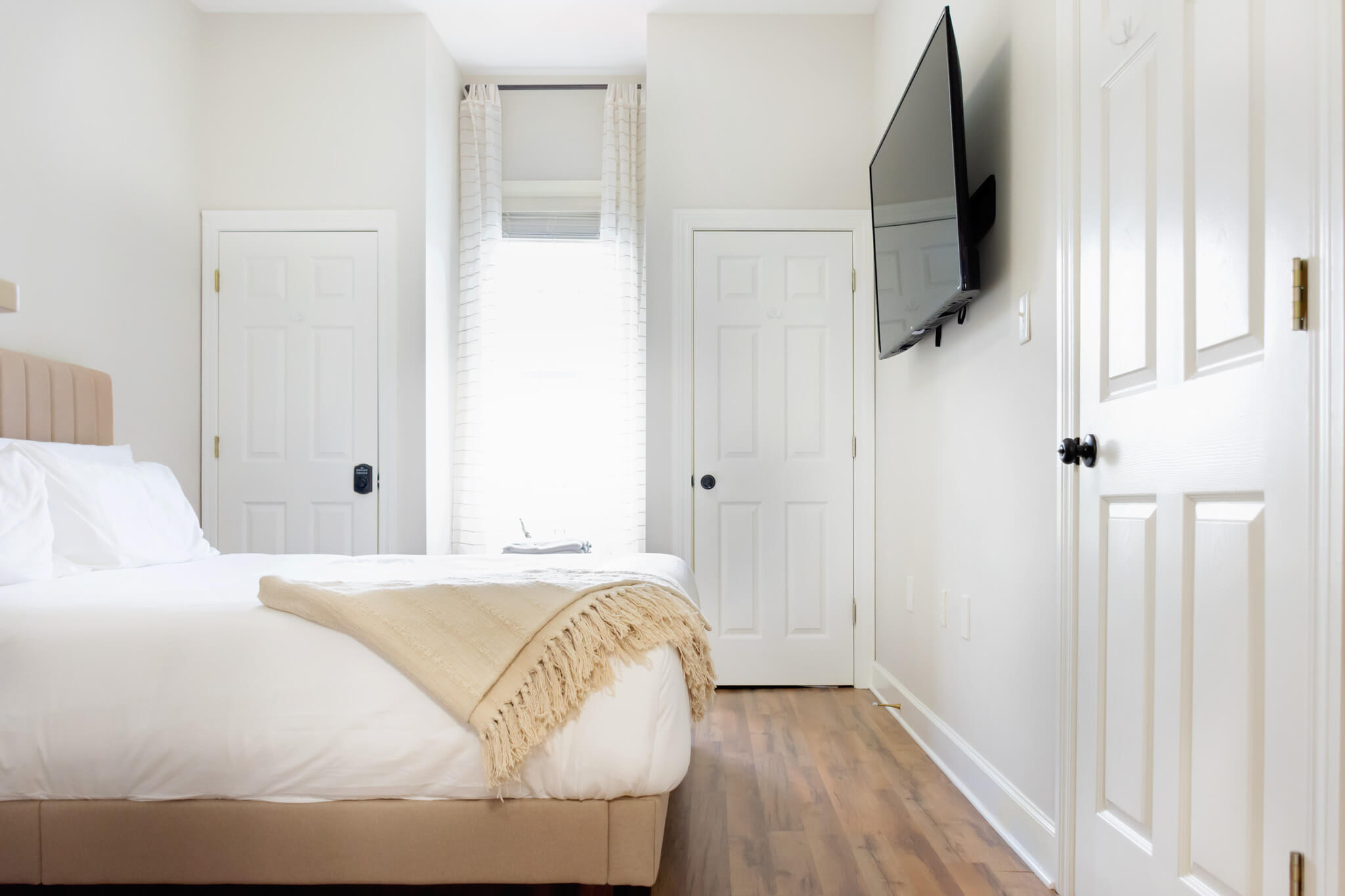
Things To Consider Before Accepting Longer Airbnb Rentals
Before you decide to accept or decline a longer booking, you need to consider six main points. These are often the big differentiators from the short-term stays that you usually have and things you may not even have thought about until now.
I will go through them in what I consider to be their importance!
#1 Local Laws and Regulations Including Taxes
First, it is very important to understand the legal implications of long-term stays in your area. Some regions grant tenant rights after a certain period, which can complicate the eviction process. These vary quite a bit, so just do a quick online search to find out what applies to your location.
You will want to check if there are restrictions on long-term rentals or specific regulations that apply to extended stays. Most often, communities have more regulations on short stays than long ones, but it’s worth checking.
Additionally, short term and long term rentals can be taxed differently. For example, your local tourist tax may only apply to stays of a certain duration. On the other hand, when you are filing your income taxes, the IRS has different definitions and rules for rental income earned from the two. Often, you get more tax breaks when running a short term rental business (that you actively participate in) with an average stay of 7 days or less. It is best to consult your accountant or tax expert for the most accurate information for your situation.
READ: Guide To Airbnb Taxes: 3 Types To Consider
#2 Flexibility For Personal Use
For many of us, our Airbnb is somewhere we love to visit often. I love staying at our condos on 30A! Decide if you want to have the option to use the property for personal use or seasonal maintenance during those slower months. Long-term stays reduce this flexibility.
#3 Financial Impact, Pricing, and Discounts
In general, short term rentals make the most money. However, they also require the most work!
READ: Protecting Your Three Ps As An Airbnb Host: Property, Profits, Peace
Here, you should calculate the potential earnings from long term rentals versus short term rentals. Consider whether the lower average nightly rate of a long term stay is offset by the stability and reduced turnover costs. Frequently, people expect a fairly significant discount on what would normally be your short term rates.
The longer you are an Airbnb host, the better you will be able to determine whether it is worth it.
For example, let’s day someone inquires about a monthly rental in my one bedroom Seacrest Beach condo in March 2025. I can easily run a report to see exactly what I made in March 2024. Let’s say my property grossed $8000 after subtracting out cleaning fees. I could do back and offer a discounted rate of $6800 which is really as low as I would go. Chances are that the renter wanted to pay well under $4000. It makes zero sense for me to do that.
On the flip side, let’s look at my slowest month, February. If my property only made $2400, I would feel comfortable going as low as $2000, which may work for them.
Basically, if your property has low occupancy during certain seasons, such as a beach house, longer stays could help fill gaps and maintain income. This is very dependent on property type and location. But, it usually only makes sense to take longer bookings over your slowest months.
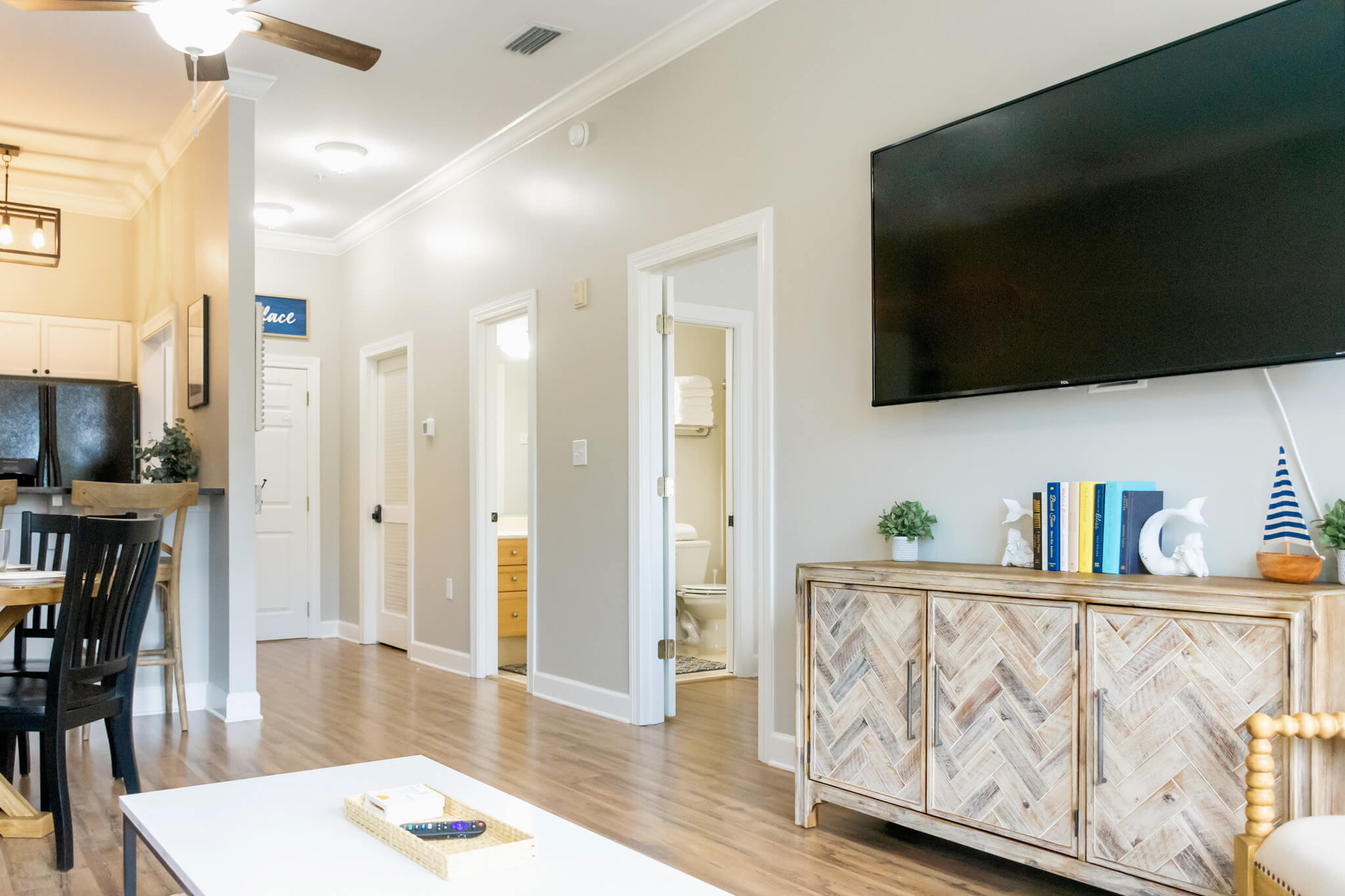
#4 Target Market & Location
This ties into the last point a bit. You want to make sure that you know your market and your property!
Consider who your typical guests are. If your property attracts tourists, short-term rentals might be more lucrative. Plus, if it’s a seasonal destination within a very quiet off-season and limited amenities, would someone really want to be there for an extended amount of time?
However, if you’re near universities or corporate hubs and not working around vacation seasons, long-term stays might be in higher demand. They might not even want as significant a discount. In fact, you may find it more lucrative to rent your place to a monthly business tenant in a college town than to rent it only on 2 weekends a month for college game days.
You also want to think about your space. A standard home is often a good fit for a long rental with plenty of closets, dressers in every room, and a full kitchen. In my case, my 30A beach rentals are studios and one-bedroom condos with limited closet space. In my studios, there are neither dressers nor full kitchens. It would not be comfortable to try to settle in to for an extended stay, but it makes a great place for a weekend getaway.
These issues may not have occurred to your potential renters. Personally, I have had to mention the above concerns with multiple long-term rental inquiries. In almost every case, they quickly realized it wouldn’t be a good fit.

#5 Property Management & Upkeep
This is listed last but is something you want to think long and hard about. Who is going to take better care of your property? Because it’s not always crystal clear.
It may be easy to say that a longer stay requires less upkeep. But your short term rental is cleaned top to bottom multiple times a week, keeping it in overall good shape. Long-term guests may mean less frequent cleaning and maintenance. However, issues can accumulate when you can’t lay eyes on your property as often as usual. Ensure you have a plan for regular upkeep to prevent issues from building up.
The type of guest also makes a big difference. Oftentimes, a snowbird couple has decades of homeownership under their belt and leaves a small footprint. Contrast that with a young family looking for a three-month rental between leases. The latter will typically lead to more wear and tear.
READ: How To Be A Great Airbnb Guest
With true long term rentals of a year or more, it’s not uncommon to have to paint, deep clean, and refresh a property after moving out. That is factored into your cost of doing business for that style of rental. You don’t want to find yourself having to patch holes and repaint because a two-month guest made themselves a little too at home in your place. Since longer stays could increase the risk of wear and tear, ensure you have proper insurance coverage and a security deposit policy in place.
With long-term stays, it’s crucial to thoroughly screen tenants, as they’ll be in your property for an extended period. Consider conducting background checks and verifying references. This is not always easy with Airbnb. Long term rentals also mean you’re trusting one guest or group for an extended period. Consider the potential for issues like noise complaints, damage, or other disruptions.
#6 Community and Neighbor Relations
Lastly, be a good neighbor! In many cases, your neighbors will prefer a well-behaved, consistent tenant. They are often less disruptive than a stream of different short-term guests. That is if you have screened them well! However, if your property is in a popular destination market, your long-term renters might not like having a steady stream of new (often a little loud) vacationers next door each week.
If your property is part of an HOA or COA, check their rules regarding the duration of rentals. Most often, they will have more restrictions on shorter stays than on long term rentals.

PROS For Long Term Rentals At Your Airbnb
So, to summarize, here are some of the positives of allowing longer stays at your Airbnb.
Stable Rental Income: Long-term rentals provide a consistent and predictable income stream, reducing the uncertainty of fluctuating occupancy rates during your slow season.
Reduced Hosting Effort: Once you secure a long-term tenant, you don’t have to constantly market your property, manage bookings, and field inquiries. With only one tenant, there’s less coordination required for check-ins, checkouts, and guest communication.
Lower Turnover Costs: With fewer guests, you’ll spend less on cleaning, laundry, and maintenance between stays. This can save both time and money.
Sometimes Less Risk: As long as you screen them appropriately, fewer guests mean less frequent use of amenities and furnishings. They may be more mindful of your space. This potentially lowers the risk of damage caused by careless vacationers.

CONS Of Allowing Airbnb Long Term Rentals
On the other hand, if you are an Airbnb host whose goal is to maximize cash flow and profits, you may not be the best fit. This is especially true if you like to visit often both to enjoy your property and lay eyes on it.
Lower Profit Margins: Nightly rates for short-term rentals are typically higher, so long-term rentals may bring in less revenue overall.
Legal and Regulatory Challenges: Some areas have specific laws governing long-term rentals and tax rates, which can be more restrictive or require additional compliance.
Tenant Rights: In many jurisdictions, long-term tenants gain certain rights, making it more difficult to evict them or regain possession of your rental property.
Limited Flexibility: A long-term lease ties up your property, making it unavailable for personal use or for short-term rentals during peak seasons.
Potential for Neglect: Long-term tenants may treat your property with a different level of care than short-term guests, leading to potential maintenance issues over time or requiring a lot of work to get your furnished rental back to good after checkout.
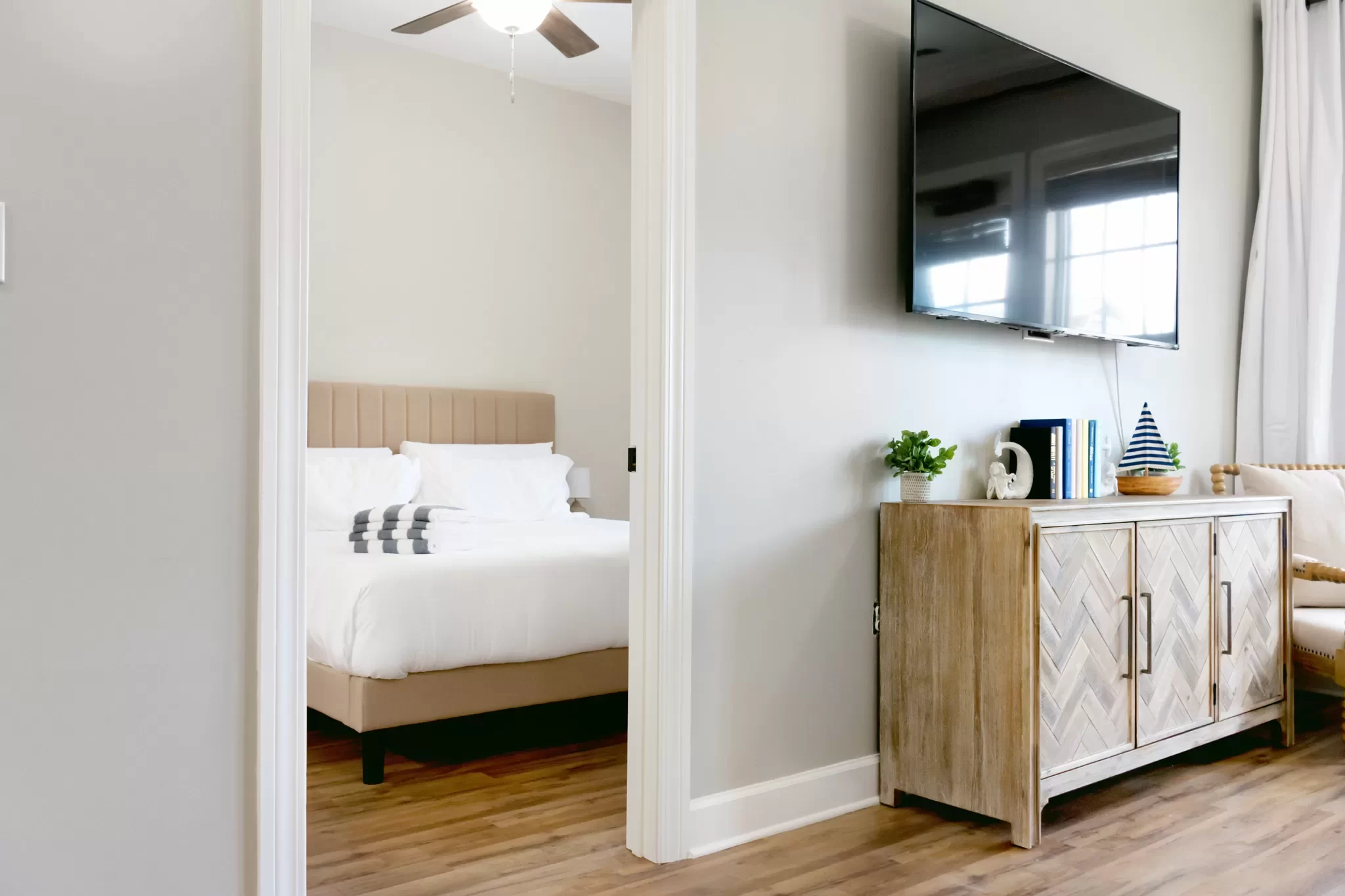
FAQs about Airbnb Long Term Rentals
This post has already covered a lot of great info for deciding whether or not to allow longer stays at your Airbnb. At the end of the day, you are the owner of your property or properties and need to make the best decision for you.
However, I quickly want to answer a few frequently asked questions that may not have been covered above!
How Much Should You Discount Long Term Stays in Your Airbnb?
If you have been hosting for at least a year, I recommend looking at your gross income from that month in years past. Then, back out the cleaning fees. Since a longer stay requires a lot less work on your end, I would then take off around 15% to 20%.
If you are a new host, look up the same dates on Airbnb and VRBO to see what other hosts are charging for a longer stay in your area. Compare your accommodations and amenities and go from there!
Should You Require Additional Cleanings For Longer Airbnb Stays?
I have seen many hosts require cleanings during a longer stay to help avoid more serious issues and buildup. Plus, it allows you to keep an eye on the place. Some require a weekly clean; others require a monthly clean.
I personally think this is a great idea for stays between 3 and 9 weeks, where you really don’t want people to “move in” and create a bunch of extra work for you at checkout!
What If My Long Term Tenant Won’t Leave My Airbnb?
This doesn’t happen often, but it does happen and is usually a nightmare for rental owners. In this case, consult your local laws. In most cases, you will need to get the Sheriff’s office involved and may need to serve the renter with an eviction notice.
Should I Host Snowbirds In My Vacation Rental?
Snowbirds are a great idea to help offset a slower season in a popular vacation destination. I recommend that you be mindful of important dates, such as Spring Break, festivals, etc., when you could potentially earn significantly higher rates.
For example, if Spring Break season starts mid-March and your potential long term renter wants to stay from January 1 through March 31, it’s a good idea to tell them that you can only accommodate them from January 1 through March 15. This keeps you from missing out on top-dollar rental income.
Hosting Long Term Rentals At Your Short Term Airbnb
Overall, it’s up to you! There are so many variables, and you need to make sure it’s a good fit for you and your rental property. Longer stays can help fill big calendar gaps and give you a nice break from the day-to-day Airbnb hosting hustle. At the same time, it can open you up to some additional risks and limit your ability to enjoy your place.

More Resources For Airbnb Hosts
If you enjoyed this discussion on longer Airbnb stays, you will love my other first-hand, detail-oriented Airbnb hosting blog posts! And make sure to sign up for my brand new Airbnb Hosting newsletter.
The best way to navigate my Airbnb hosting content is to start with my FREE 5-Star Airbnb Hosting Guide. From there, you can browse the four main categories: getting started, buying guides, hosting tips, and business.
- Getting Started on Airbnb
- Airbnb Buying Guides
- Airbnb Hosting Resources
- Business & Tax Considerations
Or, just click here to browse all of my Airbnb hosting content here at Our Little Lifestyle!
PIN: Long Term Rentals At An Airbnb For Later
